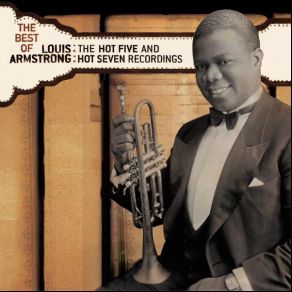The Best of the Hot 5 & Hot 7 Recordings
Download links and information about The Best of the Hot 5 & Hot 7 Recordings by Louis Armstrong. This album was released in 2002 and it belongs to Jazz, Vocal Jazz, Pop genres. It contains 18 tracks with total duration of 54:39 minutes.

|
|
|---|---|
| Artist: | Louis Armstrong |
| Release date: | 2002 |
| Genre: | Jazz, Vocal Jazz, Pop |
| Tracks: | 18 |
| Duration: | 54:39 |
| Buy it NOW at: | |
| Buy on iTunes $9.99 | |
| Buy on Amazon $9.99 | |
Tracks
[Edit]| No. | Title | Length |
|---|---|---|
| 1. | Heebie Jeebies | 2:51 |
| 2. | Muskrat Ramble | 2:30 |
| 3. | King of the Zulus | 3:02 |
| 4. | Jazz Lips (featuring Louis Armstrong's Hot Five) | 2:59 |
| 5. | Willie the Weeper (featuring His Hot Seven) | 3:06 |
| 6. | Wild Man Blues (featuring His Hot Seven) | 3:08 |
| 7. | Alligator Crawl (featuring Louis Armstrong's Hot Seven) | 3:01 |
| 8. | Potato Head Blues (featuring His Hot Seven) | 2:55 |
| 9. | Weary Blues (featuring Louis Armstrong's Hot Seven) | 2:58 |
| 10. | Ory's Creole Trombone | 3:02 |
| 11. | Struttin' With Some Barbecue (78 rpm Version) | 3:04 |
| 12. | West End Blues | 3:18 |
| 13. | Squeeze Me (featuring His Hot Seven) | 3:22 |
| 14. | Basin Street Blues | 3:14 |
| 15. | Beau Koo Jack (featuring His Savoy Ballroom Five) | 2:58 |
| 16. | Muggles (featuring His Hot Seven) | 2:49 |
| 17. | St. James Infirmary (featuring His Savoy Ballroom Five) | 3:11 |
| 18. | Tight Like This (featuring His Savoy Ballroom Five) | 3:11 |
Details
[Edit]This music is the urtext of jazz. Things we take for granted now — the solo that tells a story, scat singing — find their roots in the work of these Armstrong-led bands. The album's 18 tracks, which were culled from the four-CD box set, The Complete Hot Five and Hot Seven Recordings, unfold chronologically and can be divided into two parts: the 1926 and 1927 sessions, and the recordings from 1928. The collection’s thrilling first track, “Heebie Jeebies,” was the band’s first hit and includes the first recorded scat performance. As joyful and innovative as the earlier work may be, the music gets even better when 1928 rolls around. One major reason is the presence of the extraordinary Earl Hines at the keyboard. Whether he’s playing ethereal celeste on “Basin Street Blues” or letting loose a fired-up piano solo on “Beau Koo Jack,” he brings a high level of artistry to the proceedings. And of course it’s fascinating to hear Armstrong develop his style, track by track, throughout this seminal period. 1928’s “West End Blues,” with its legendary unaccompanied opening trumpet statement, might be the brightest burning star on the album, but there’s much else to behold on this essential disc.